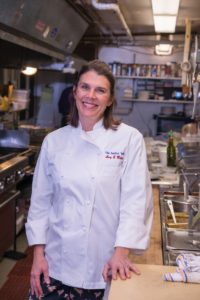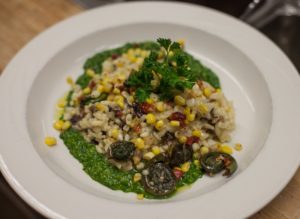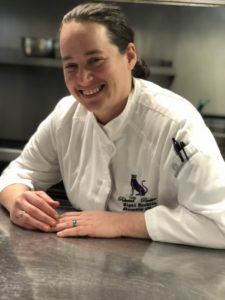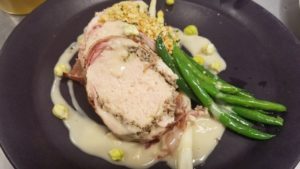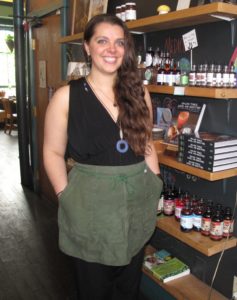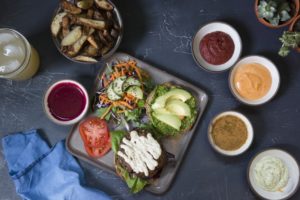By Nicole Colson
Most of us don’t consider who’s preparing our meal when we dine out. If we were paying attention, though, we might be surprised to learn that only 20 percent of chefs in this country are women and that they earn nearly 30 percent less in base pay than their male counterparts. And only 7 percent of those women chefs are head chefs.
These statistics come from RestaurantHER, an initiative food-delivery service Grubhub launched early this year. In addition to highlighting woman-led restaurants via an interactive database and map, Grubhub made a matching donation to anyone who pledged to dine in or order from the restaurants.
The first $100,000 goes to Alexandria, Virginia-based Women Chefs & Restaurateurs, which aims to advance women in the culinary industry.
The number of women-led restaurants in Southern Vermont reflects that very modest national figure, yet they are here, creating menus and working in the kitchen—masters of their craft.
We spoke with three women chefs who helm their own establishments. With every menu idea, flash of a knife, and artful garnish of a plate, they’re making culinary history:
Amy Chamberlain
Owner and executive chef, The Perfect Wife Restaurant and Tavern, Manchester Center
A Manchester native, Chamberlain attended The New England Culinary Institute and worked in kitchens all over New England and in Aspen, Colorado. She opened The Perfect Wife in 1996.
“I wanted a lively bar crowd with live music,” Chamberlain said of her first days in business. “I had an opportunity to be creative with my food. I’ve been doing that for 21 years.”
Chamberlain labels her cooking “freestyle.” She starts with classic dishes and gives them a unique twist.
This year, she turned the restaurant’s fine dining room into an event space and combined the fine dining and tavern menus. She expanded the tavern’s menu to include her home-style comfort foods, such as chicken pot pie and beer-battered crawfish tails, with dining room favorites such as her warm spinach salad with goat cheese fritter and sautéed jumbo shrimp scampi served over spinach and roasted garlic ravioli.
What hasn’t changed is Chamberlain’s commitment to supporting local agriculture and locally produced foods, which diners find reflected in her seasonal menus.
Chamberlain, a member of the Vermont Fresh Network, says she’s been buying food from her back door since she opened—and has seen more and more local farms pop up since the movement began.
“I’ve always tried to buy as much as I can from them and try to represent Vermont on the menu as much as possible,” she said, taking in “the taste and color—the freshness of things.”
Of the energy in the food picked closer to home: “You can’t put a price on that,” she explained.
Chamberlain takes her commitment several steps further, regularly sponsoring charitable events in and around Manchester and raising funds for local non-profit groups in support of local agriculture.
Chamberlain’s culinary vision has earned her valuable attention: She’s appeared on the Food Network five times, including nailing two victories on “Ready, Set, Cook!”; she was chosen to represent Vermont and the United States in Dijon, France in 2009 at the Festival of Music and Food in the company of such culinary celebrities as former White House pastry chef Bill Yosses; and in 2010 she was named Vermont Chamber of Commerce Vermont Chef of the Year.
A member of Women Chefs & Restaurateurs, Chamberlain uses her networking skills to help others in the industry. She’s hired many women as interns from several culinary schools and has helped several apply to New England Culinary Institute.
She recently spoke to sixth-graders at Manchester Elementary School about operating her business.
“I made it very clear that it’s hard work, but hopefully the creative freedom of cooking that I conveyed didn’t dissuade them from considering it,” she told us.
Running a business is always challenging and being a woman chef hasn’t gotten in the way. In fact, she says, she thinks it’s helped.
“I have great relationships with my salesmen and honest respect from my customers,” she said. “I work very hard and I am quite strong mentally and physically. There’s no reason for anyone to doubt that I can do my job.”
Sigal Rocklin
Executive chef, The Reluctant Panther Inn and Restaurant, Manchester Center
Rocklin came to run the kitchen at The Reluctant Panther by way of Israel, where she grew up. She came to the United States after serving as sergeant in the Israeli Navy.
She also attended New England Culinary Institute in Montpelier, where she met her husband, also a chef.
Later, the couple traveled widely across the States, working in restaurants in Arizona, South Carolina, California, Wyoming, and Colorado before returning to Vermont, where she landed a job at Equinox Resort in Manchester. She spent three years there as a chef de cuisine.
Now, Rocklin oversees a staff of five in the kitchen at The Reluctant Panther, which has 20 rooms and is an event venue that received a Gold Barn Honor from Vermont Fresh Network. Rocklin said she was hired for her menus, which highlight local Vermont produce and fresh seasonal fare.
“I think the owners and hotel manager were happy I value the community,” she said. “I think that by helping my farmers and producers by buying locally it supports the economy, produces better food, and can make Vermont better.”
And although Rocklin seeks out ingredients at local farmer’s markets, her relationships with her suppliers run much deeper.
“People care about each other and believe in and support the community,” she said. “We’re raising the bar and doing something great together.”
One farmer gives her a seed catalog and grows food for her to use in her cooking—and even gives her seeds to grow food in her home garden. The farmer who supplies her with microgreens gives her ideas on how to use them and allows her to experiment.
Rocklin often plants and picks alongside these farmers in the greenhouse.
“I like to see their operation and where the veggies come from,” she said.
A winter dish starring in Rocklin’s winter menu is local pheasant served with local sweet potato puree, Moroccan spice, and black garlic sauce she makes from the pheasant stock.
“They [the suppliers] are so passionate and bring me the best pheasants they can,” she said.
Although she has a lot of support from her husband, who also works long hours in a kitchen and understands the physical and emotional demands of the job, Rocklin aims high to prove to herself that she can do anything she sets her mind to.
“You have to work hard and still be part of the kitchen,” she said. “And you have to not be afraid to be a woman at the same time.”
She also enjoys teaching others.
“It’s nice to see passionate women and to help them develop that passion and see what they become,” she said.
Jessica Jean Weston
Owner and executive chef, Superfresh! Organic Café, Brattleboro
Superfresh!, one of the women-led restaurants listed in RestaurantHER’s database and on the national map, is the result of owner Jessica Jean Weston’s journey to health.
A holistic health coach and graduate of the Institute for Integrative Nutrition, Weston began her journey to health when she discovered she had food intolerances.
After a time exploring food as medicine, which led her on a path with Mayan healers in Belize, shamanic practitioners, herbalists, and to organic farms, she developed a non-GMO, plant-based diet free of soy, gluten, peanut, dairy, eggs and meat.
Her restaurant’s plant-based vegetarian menu includes raw foods, baked desserts, snacks, and, of course, juices, smoothies, and her own elixirs with ingredients primarily sourced from local and regional farms.
Weston, who opened her café in its current location in early 2014, has studied food as medicine, nutrition, and health for more than a decade.
Her first cookbook on healing tonics, juices, and smoothies includes recipes for highly nourishing concoctions that do everything from flush toxins and boost immunity to alkalize the body and enhance brain function.
She is in the proposal process for her second book, which will focus on raw desserts.
“Knowing where my ingredients come from is important to me,” she said. “I’m constantly looking at the best sources and communicating with growers.”
Weston sees several local farms and foragers in the winter to talk about the products she needs and when they’ll be available.
She buys local raw honey, one of her main sweeteners, year-round.
“I love working with a supplier so committed to the health of the bees and the planet,” she said, adding that she gets regular “bee reports.”
Another farm grows more unusual ingredients for her: lemongrass for her Cambodian curry paste and habanero peppers for her Belizean chili sauce. Cabbage she ferments to make her kimchi comes from a local large-scale organic farm; Vermont-grown spirulina she adds to juices and desserts; the bulk seaweed she buys comes from farther away, on an island in Maine.
She buys four kinds of seaweed based on the harvest schedule and what’s in stock. She soaks her legumes overnight in seaweed before cooking them, as this makes the legumes more digestible and releases enzymes.
She’s looking into local legume and grain suppliers, and she plans to grow her own sprouts.
Weston dehydrates herbs for the teas she serves as well as several varieties of mushrooms local foragers provide.
When she’s not sourcing local ingredients, she teaches. One class she led recently focused on foraging for and cooking with wild edible and medicinal weeds.
“It’s so important to have close relationships to those who grow our food and support our local economy,” Weston said. “That web we weave gets stronger the more we work together.”
The majority of the cooks Weston has hired to work in her kitchen are women. It wasn’t an intentional choice, but they do all have something in common.
“They align with our mission,” she said. “They want to serve healthy food.”
Weston didn’t work in this kind of environment in food service, which she started doing at 18. “I don’t remember seeing women in the kitchen,” she said.
She said she feels fortunate she started her own business at 23.
“I was able to create the culture I wanted,” she said. “I’m the boss and I’m in the kitchen all the time. I’m leading the way.”
She also feels fortunate to own and operate her business in the state.
“I think Vermont is open and supportive of small businesses and women in business,” she said.


